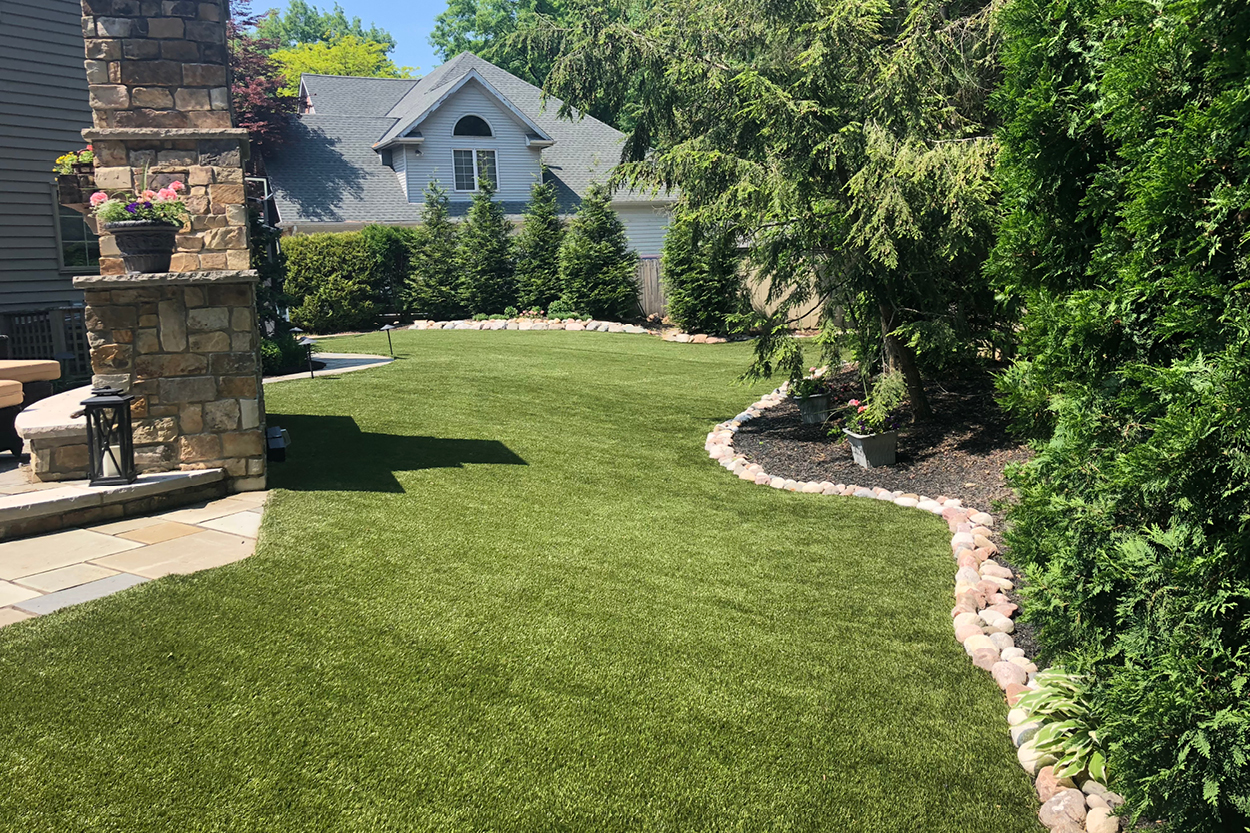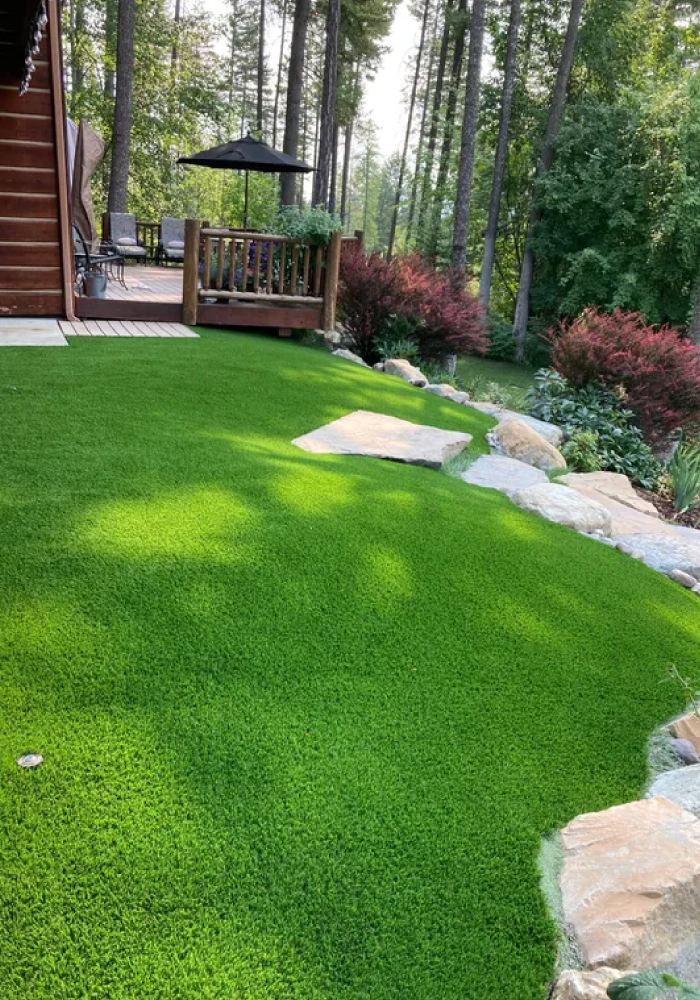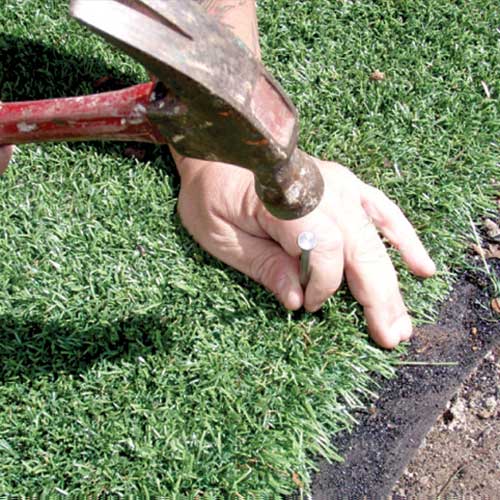Leading Phoenix Turf Companies Offering High-End Synthetic Lawn Products
Leading Phoenix Turf Companies Offering High-End Synthetic Lawn Products
Blog Article
Explore the Environmental Benefits of Opting for Artificial Grass Solutions
The fostering of synthetic grass solutions presents an engaging chance to deal with pressing ecological obstacles. By considerably decreasing water usage and lessening the application of damaging chemicals, these choices not only advertise lasting landscape design however likewise protect regional ecosystems. Furthermore, the reduced carbon footprint related to decreased maintenance activities adds to an extra sustainable method to land management. Nonetheless, the ramifications of these advantages prolong past plain preservation efforts, raising questions about their long-lasting influence on habitat conservation and overall environmental equilibrium. Discovering these dimensions exposes a complicated interplay worth taking into consideration.
Water Conservation Advantages
One of the most substantial benefits of synthetic grass is its capability to preserve water. In contrast, man-made grass does not need watering, substantially reducing the overall need for water resources.
By removing the need for normal watering, man-made turf adds to sustainable landscape practices and aids minimize the environmental influence of too much water consumption. The conservation of water extends to the reduction of drainage, which can lead to dirt disintegration and waterway contamination.
Furthermore, the installation of synthetic grass allows districts and home owners to assign water resources much more successfully, focusing on crucial usages such as alcohol consumption water and agriculture. The shift towards synthetic grass not just promotes responsible water use but additionally lines up with wider environmental goals focused on maintaining natural resources.
As areas significantly focus on sustainability, the water preservation advantages of synthetic lawn offer a compelling instance for its adoption in commercial and property landscape design jobs.
Minimized Chemical Usage
The shift to fabricated turf considerably lowers the reliance on chemical therapies generally made use of in all-natural yard upkeep. Conventional lawn management normally entails the application of pesticides, fertilizers, and herbicides to advertise development and control insects. These chemicals can pose threats to human health, neighborhood wildlife, and the atmosphere, adding to dirt and water contamination.
In comparison, man-made grass eliminates the requirement for these hazardous substances. As soon as installed, it needs very little upkeep, mostly including regular cleaning and seldom infill replenishment. This reduction in chemical usage not just benefits the instant setting however likewise adds to more comprehensive eco-friendly security. By reducing the launch of artificial substances right into the community, man-made turf promotes much healthier soil and water supply.
Additionally, the lack of chemical overflow connected with synthetic grass setups assists protect regional waterways from air pollution, sustaining water life and maintaining biodiversity. Phoenix turf companies. As areas progressively focus on sustainable practices, going with synthetic grass provides a feasible solution that straightens with ecological conservation goals. Via this shift, homeowner can take pleasure in lavish green areas without endangering environmental health and wellness, leading the way for an extra sustainable future
Lower Carbon Footprint

In addition, the installation of man-made lawn can cause significant water conservation. Natural yards require considerable amounts of water for irrigation, which not just adds to the carbon impact associated with water extraction and therapy but also strains regional water sources. In comparison, synthetic grass needs minimal maintenance, requiring no watering, thereby significantly minimizing water usage this contact form and its connected power costs.
In addition, the longevity of synthetic grass adds to its decreased carbon impact. With a life expectancy of as much as 15 years or more, the demand for constant replacements is reduced, leading to less waste and reduced energy consumption in manufacturing and throwing away typical lawn choices. Generally, fabricated grass offers a sustainable option for environmentally aware landscaping.
Habitat Conservation
Environment preservation is an important consideration in the dispute over landscape design selections, especially when contrasting fabricated turf to all-natural grass. Natural lawn yards frequently call for extensive maintenance, consisting of making use of herbicides, chemicals, and fertilizers, which can adversely influence neighborhood environments. These chemicals can seep right into the dirt and rivers, harming native flora and fauna and disrupting regional habitats.
Synthetic grass gets rid of the need for damaging chemicals, consequently shielding close-by wildlife and preserving the honesty of bordering ecosystems. The setup anonymous of man-made turf can lead to the conversion of former turf areas into even more biodiverse landscapes, such as pollinator yards or native plant website link areas, which can sustain regional wildlife.
Ultimately, the shift to synthetic grass not just saves water and reduces maintenance efforts however also fosters a more harmonious relationship in between human tasks and the natural atmosphere, promoting habitat preservation while doing so.
Long-Term Sustainability
Long-lasting sustainability is an important consider assessing the advantages of man-made turf over traditional lawn yards. Among one of the most significant benefits of synthetic grass is its longevity; it can last as much as 15-20 years with very little upkeep, whereas all-natural yard requires frequent reseeding and replacement. This long life lowers the need for constant sources, such as water, fertilizers, and pesticides, which are crucial for preserving a healthy grass yard.
Furthermore, fabricated lawn adds to a decrease in carbon emissions linked with lawn care tools. Standard lawns usually call for gas-powered mowers, trimmers, and blowers, all of which add to air pollution. Turf installation phoenix az. On the other hand, fabricated turf removes the demand for such tools, promoting a cleaner setting
Additionally, the manufacturing of synthetic grass significantly makes use of recycled products, enhancing its sustainability profile. As suppliers embrace environment-friendly methods, the environmental impact of synthetic grass proceeds to diminish.

Final Thought
The adoption of synthetic grass services provides considerable environmental advantages, including substantial water conservation, lowered dependence on unsafe chemicals, and a lower carbon impact. Artificial turf help in protecting natural habitats by decreasing land disturbance and advertising long-lasting sustainability through the use of sturdy materials. Collectively, these aspects emphasize the possibility of synthetic grass to add favorably to ecological wellness and supply a practical option to traditional landscaping methods in an increasingly resource-conscious world.
In comparison, fabricated turf does not need watering, dramatically lowering the general need for water sources. By decreasing the launch of artificial compounds into the community, man-made lawn advertises much healthier soil and water systems.
Furthermore, the setup of synthetic lawn can result in substantial water preservation. In comparison, artificial grass requires marginal upkeep, needing no watering, thus significantly lowering water usage and its linked energy costs.

Report this page